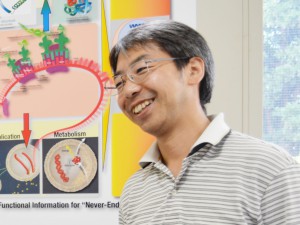ELSI Blog
1 Interdisciplinary Dialogue: An Exciting Challenge
ELSI director reflects on the past six months of the institute, balancing scientist and directorship through the exciting challenges of interdisciplinary studies.
Interdisciplinary Dialogue: An Exciting Challenge -Kei Hirose-

ELSI recently had its six-month birthday, since its official launch on Dec. 7, 2012. Much like a parent with a newborn, the time that has passed feels both long and short at the same time. (I should point out here that I am a geologist studying the early Earth so my sense of time may be on different time scales!)
In the first couple of months of ELSI's infancy, my key lieutenants and I worked around the clock from our offices in different buildings, putting the structure of our institute together. In the next couple of months, various functions of our institute began to work together as we acquired our own temporary building. This gave cohesiveness to the institute. We put in place committees that oversee different operations and hired a good team of administrative staff. This spring, the seeds of our early work are taking root. Our scientific activities have begun to grow on its own, through weekly seminars, lunch presentations, workshops, and even our first symposium. There is still a lot of work ahead but I am proud of our progress.
As a director, the most exciting challenge (and I emphasize both words, exciting and challenge) is to guide our institute through its interdisciplinary waters. I knew this would be a challenge but to what degree, I was not ready for. The research goals of ELSI, by nature, require us to be truly interdisciplinary. Our scientists, from PIs down to graduate students, are humbled daily by our need to learn about each other's fields, to learn from each other. Our weekly ELSI Seminar is well attended by our researchers from all backgrounds. We have five Study Groups ("Planetary Water", "Prebiotic Chemistry", "Biosphere", "Solid Earth", and "Planetary Exploration & Life") that pursue their own topics but also work on teaching and sharing their discussions with each other.
Cross-disciplinary dialogue requires an open mind that is ready to learn a new language. At ELSI, it feels like we are learning a few new languages all at once. At this stage, the scientist in me wants to take one step back and observe, to understand what kind of focus our institute should have to unite our areas of Geology, Biology, Chemistry and Planetary Science. As a director, I feel the urgency and need to keep our institute "on message" in our research goals so that we do not revert into our own disparate corners. This will be an ongoing challenge but a very exciting one because it gives us all a great opportunity to learn beyond our immediate specialty.
We have many things to look forward to in our near horizon. The renovation of our current building has started while the construction of our new building will begin this autumn, scheduled to be finished in early 2015. We are in the process of selecting our postdoctoral candidates, who will bring fresh infusion to the institute this fall. One of our PIs, John Hernlund, will be moving to Tokyo with his wife (also an ELSI scientist) and their baby this summer. We are looking forward to welcoming the youngest member to our ELSI family. We will have two professors coming on sabbatical this fall in addition to a growing list of visitors in our calendar.
All the while, my own research on the Earth's core moves forward. I published a review article in Annual Review of Earth and Planetary Sciences. I will be moving my lab to the ELSI building, which will lessen my commute between Director and scientific work. I am organizing a workshop on core transport properties this October.
I am used to looking down, deeper and deeper into the Earth's core. Our research questions into the origins of life in the early Earth context lead us to think about the universality of life, on other planets in our solar system and beyond. The direction and progress of ELSI take my vision upward and outward. This is a nice complement!











